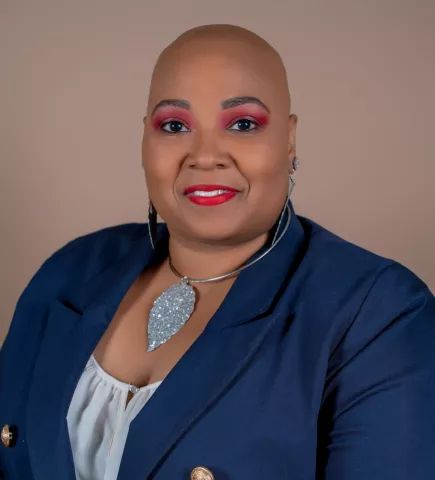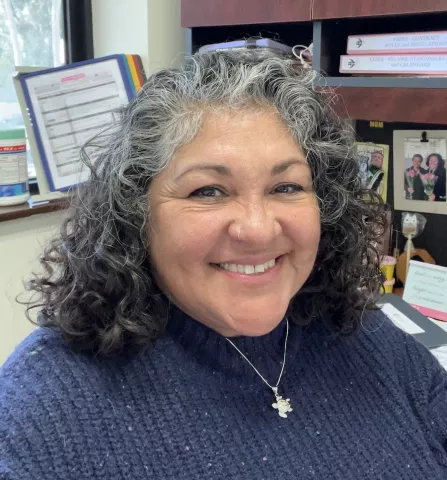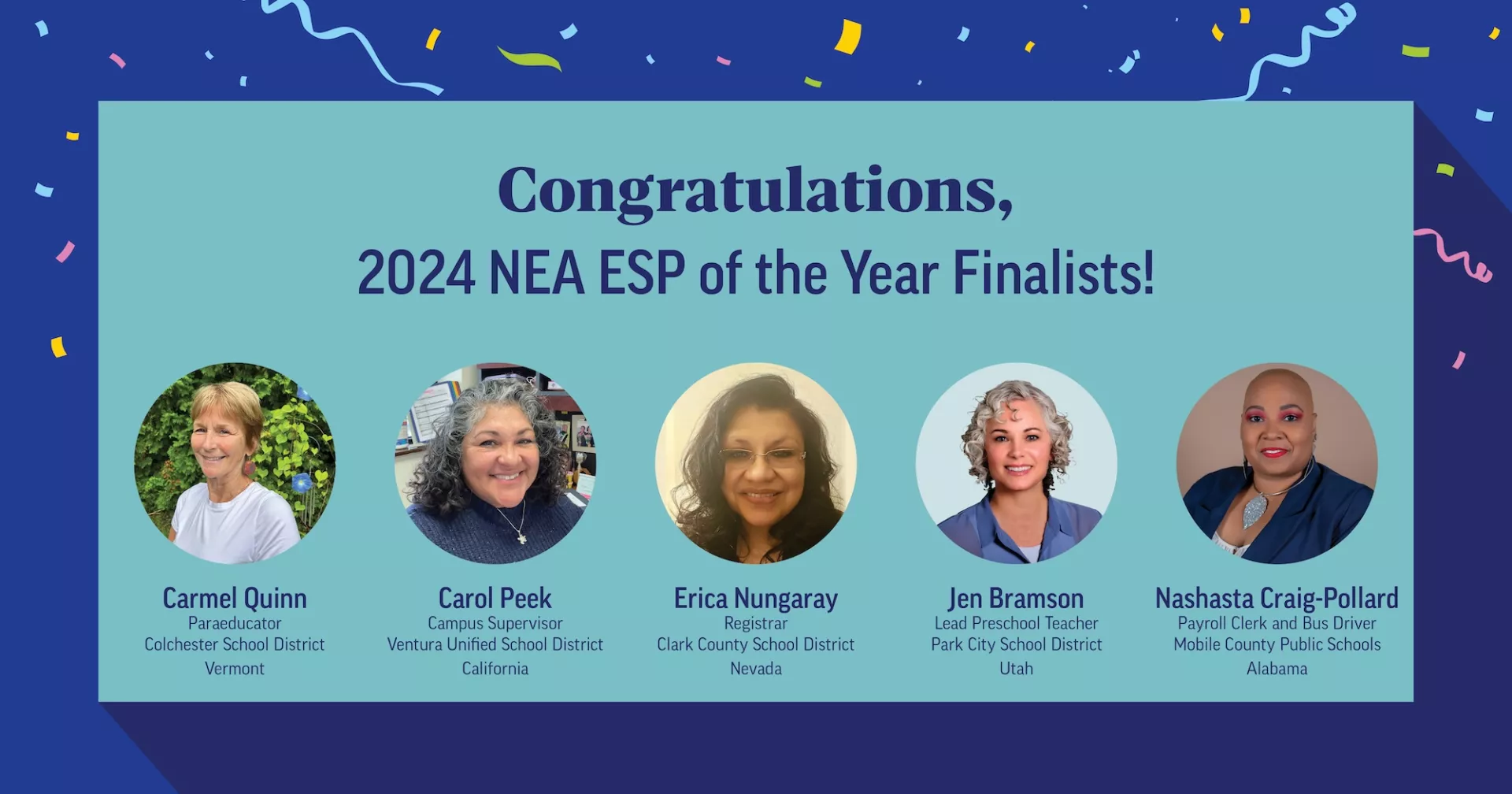
Each year, NEA honors one outstanding ESP as the ESP of the Year to serve as an ambassador for all ESPs. Though one is chosen, many are nominated, and, for the first time, NEA is excited to publicly announce the top five finalists for the prestigious award, which recognizes and honors the contributions that all ESPs make towards ensuring great public schools for every student.
Read on to meet the five finalists for this year’s ESP of the Year!
Jen Bramson: ESPs are My Why!

Jen Bramson is an early childhood educator in Park City, Utah, a diverse mountain town outside of Salt Lake City.
“My preschool class is made up of children who haven’t had the same opportunities, and they enter preschool on an uneven playing field. I scaffold lessons to the individual children's needs,” Bramson says.
Some of the most important lessons Bramson imparts to her preschoolers are communication, listening, and problem-solving skills. Those same skills are what make Bramson an exceptional educator, union activist and leader.
Bramson has worked for Park City School District since 2013 and teaches preschool at McPolin Elementary School, a Title 1 school with a diverse student population, a dual language program of Spanish and English, and strong community involvement.
Bramson struggled with ADHD and dyslexia as a student and knew from an early age she wanted to help students recognize their strengths and help them learn how to learn.
She gets English learners to benchmarks, works with the Special Education department to provide students with interventions, took behavior technician training, and collects data to get Individualized Education Plans for students who need them before they begin kindergarten.
As a board member of the Utah School Employee Association, representing ESPs across the state, she is developing a pilot program to bring seven rural district associations together to form a coalition.
Bramson will also embark on a listening tour to interview paraeducators across the state.
“I am the paraeducator representative on the board and I hear from other paras that they are in crisis and leaving the profession in record numbers,” she says. “Paras are asking for training to keep themselves and their students physically and mentally safe. They need help negotiating for fair pay and professional respect.”
Bramson has spent many “Educator Days” on Salt Lake City’s Capitol Hill raising awareness about ESP needs and contributions, and challenging representatives to “actually read the bills.”
“In Utah, ESPs are still referred to as ‘classified employees.’ Bramson has been looking for a legislator to sponsor a bill to officially change the name to education support professionals.
“I want people to understand that we are skilled professionals dedicated to our craft,” she says.
Bramson also served with PCCEA President Gina Cox on the negotiating team representing ESPs in her district. They collaborated with the district to do a job study and discovered that district wages weren’t competitive, leaving schools critically short-staffed.
They were able to negotiate an $8 an hour market correction, bringing their lowest paid employees to $20 dollars per hour, while raising all steps by $8. They also negotiated the same 16 percent raise the teachers received.
“This has been a life-changing raise for the ESPs in my district,” Bransom says. “We have heard that members have been able to quit second jobs, have postponed retirement to earn higher Social Security. One woman was able to save her house, and many more have said that they feel valued.”
Bramson says, “Improving the lives of my fellow ESPs is my why!”
Nashasta Craig-Pollard: Always Striving to Serve

Since 2021, Nashasta Craig-Pollard has served as the payroll clerk for the Mobile County Public Schools district in Alabama. However, she is known to wear many hats and to pitch in to ease the ongoing ESP staff shortage.
“In my school district, I have to fill in and do whatever I need to do to get the job done,” Craig- Pollard explains, “I transport students on school buses during the week because of our bus driver shortage.”
Craig- Pollard became a school bus driver in 2001 and in that role always takes time to connect with and care for students. “The time I do have with them is valued. It brings me joy to learn a little bit about the students and their various personalities,” Craig- Pollard says. “Some of them live in underserved and often dangerous communities. Because of this, I take as much time as I can to talk with them and let them know that they can still make it. I had a challenging upbringing and I made it; they can do it, too.”
Craig- Pollard not only looks out for her students, she also cares for her entire community. She organizes a caravan with fellow members to deliver blankets, food and toiletries to pockets of the city with high rates of homelessness and donates toiletries and socks to residents in local nursing homes four times a year. She volunteers at Ronald McDonald house every month, helps organize an annual rally to end community violence, cooks and serves Thanksgiving meals at the Salvation Army, and collects holiday toys for the Toys for Tots program and for children with incarcerated parents.
She even helps transport evacuees to storm shelters during Mobile’s active hurricane season.
But to Craig- Pollard, caring for the community goes hand in hand with instilling community pride. She lives in Africatown, an historic community three miles north of downtown Mobile. It is the site of the last slave ship, the Clotilda, that in 1860 illegally smuggled 110 West Africans against their will to the U.S. more than 50 years after the slave trade was banned.
“Africatown has become an international tourist destination and I help with community organizing to ensure that the property in Africatown is restored and maintained,” Craig- Pollard says. “I also work to raise awareness of community improvement grants and opportunities for preserving the historic value of the homes and property of elderly Africatown residents.”
Craig- Pollard carries that energy and drive to make a difference in everything she does, especially her union activism.
“One of my proudest leadership moments was earlier this year when I organized a call to action after the local school board of education announced a change in the pay schedule for district ESPs from semi-monthly to monthly,” she says. “I contacted state association leaders and staff members, local school board members, the school superintendent, local elected officials, and the news media to express my serious concerns about the negative financial impact on families.”
After a press conference she helped organize, the decision was tabled, but she continued contacting board members and the school superintendent and, at the next local school board meeting, the decision to change the pay schedule was reversed.
Go-To Leader for ESPs
Craig-Pollard continues to advocate for Alabama students and educators as an ESP state leader.
“I have been an NEA director since 2017,” she explains, “I am the go-to leader for all things ESP in this state.”
She successfully lobbied for ESPs statewide to be paid a minimum of $15 per hour. She advocated for ESPs to continue to being paid during COVID when in some states they were not paid at all.
Craig-Pollard is always looking out for the wellbeing of her community. She is a fierce advocate for public education, a state ESP leader, and an exceptional bus driver.
“I know that I am the alpha and the omega to education for these children,” she explains about the students whom she transports each day, “Their days begin and end with me. I care and do not know where else I would rather be.”
Erica Nungaray: A Strong Advocate for Schools and Communities

Erica Nungaray is committed to supporting students and educators alike. Working for her school district in Nevada, she says, “isn’t just my job. It’s my community.”
She began her career in public education as a paraeducator in a classroom for students with autism before branching out to other areas of special education.
Since 2022, she has served as the school registrar of the Clark County School District (CCSD) in southern Nevada. “
“At her school site, her bright smile in the front office is often the first one people see each day,” attests Nevada State Education Association (NSEA) President Dawn Etcheverry.
Outside of her job, Nungaray volunteers countless hours to serve her district. Last year, she helped organize a mariachi music program and helped raise money for students’ uniforms. “We now have over 250 students participating,” Nungaray says. She takes advantage of her bilingual skills and translator experience to connect with families and be an asset to her community.
Nungaray serves on several school organizational teams (SOTs), where she assists the principals in developing the budgets and school plans of operation. Through this work, she made it possible for an elementary school to add a campus wrap-around service organization that connects children with community resources. She was also successful in advocating for a digital marquee for a middle school, which provided informational resources for parents.
“This is satisfying work because we can truly make a difference at the local level,” explains Nungaray.
In 2021, the NSEA appointed Nungaray to the new position of ESP-At-Large on their board of directors.
“The appointment of Ms. Nungaray was perhaps one of the easiest decisions I have had to make,” recalls NSEA President Dawn Etcheverry, “She has been dedicated to the union and its vision while also working to improve the lives of ESPs throughout Nevada. Both inside and outside of her school site, her unwavering commitment to the success and well-being of our students, colleagues, and the entire educational community has made her a standout.”
‘Time for 20’
Nungaray has taken an active role with the NSEA at the state legislature and State Board of Education. One of her most prominent campaigns, “Time for 20,” called for a 20 percent salary increase for all Nevada educators, a $20 minimum wage in schools, and an average class size of 20 students.
She also actively supported the “rESPect” campaign, in conjunction with the Respect Educators Act, which focused on the needs of Nevada’s ESPs.
“For ESPs, it doesn’t matter what the job title is,” Nungaray says. “Our end goal is the same—making sure that our kids are safe, healthy, and receiving the best education possible. ESP is a category that is often forgotten about in public education and our goal is to change that way of thinking.”
Carol Peek: Safety and Support for All

Carol Peek’s number-one priority is creating a safe learning environment for her students.
From 2005-2019, she served as the campus supervisor at Buena High School in Ventura, California. Her goal was to guarantee that students felt welcome, safe, and secure.
“A safe environment is essential for student success, as physical, emotional, and mental safety all contribute to a student’s ability to learn,” Peek explains.
Peek recognizes that students’ behavioral patterns often stem from outside factors. She goes out of her way to care for students who come from low-income families, underserved communities, or who struggle with learning disabilities.
“On many occasions, I organized clothing and school supply drives to deliver to local group homes that housed some of our district students,” Peek recounts. “We collected formal gowns and suits to give to students during prom or winter formal seasons; many students would otherwise not be able to attend.”
Peek’s efforts ensure that no student feels alienated or dismissed at school. She organized a lunch-time food donation program for students who couldn’t afford school lunches to ensure that no student was left hungry.
Her compassion has touched the lives of countless students and parents over the years. “What a godsend for my son!” exclaims a Ventura USD parent, about Peek. “Carol simply got him. She was that important connection that students must have to be successful in school.”
‘We Are Not Silent Workers’
Peek became the Ventura Education Support Professionals Association president in 2019. Under her leadership, ESPs have gained the confidence to advocate for themselves and make their voices heard.
“I wanted to show the administration, teachers, and community that ESPs need to be respected and treated as professionals,” Peek explains, “We are not just the silent workers who have no say in [our] working environment.”
During the 2022-2023 school year, Peek led the VESPA team in a six-month campaign to advocate for ESP rights within the district. VESPA, in solidarity with the Ventura Unified Education Association (VUEA), worked together to ensure that ESPs remained eligible for fully funded benefits. Thanks to Peek’s advocacy, ESPs were awarded a 10 percent on-schedule raise, a 2 percent off-schedule raise, and no cap on healthcare benefits.
“By standing alongside our teachers’ union, our certified members gained respect, appreciation, and a better understanding of their ESP colleagues,” Peek says.
Peek’s outstanding leadership as VESPA president was recognized by VUEA President Dan Nelson following the bargaining win. “ESPs in Ventura have better working conditions, more respect, and are seen as partners in education by the school district and the teaching/certified staff,” explains Nelson, “Carol did that. She is an example for her association and all the employees within VUSD.”
Although Peek has transitioned from campus supervisor to VESPA president, she continues to make an impression on students and families every day. “Knowing I have and will continue to make a positive impact on students’ lives every day gives me the drive to be better, do better, and inspire others to do the same,” Peek professes. “ESPs make a difference, and I have made a difference.”
Carmel Quinn: ESP Mentor and Leader

Carmel Quinn understands that mentoring makes a difference. As a paraeducator in a third-grade classroom in Vermont, Quinn works closely with students with health and behavioral challenges. She understands that building relationships with students, teachers, and counselors is crucial to supporting her students’ complex needs. Often, this involves maintaining relationships with students for years after they leave her care.
“I have lunch the first week in July each year with a former student who I supported as they transitioned from male to female during their late primary/middle school years,” Quinn recounts. “The student is now a high school junior. This student’s amazing mother also stays in touch with me, letting me know how things are going for [them].”
To Advocate for Students, Get to Know Them
Quinn has been a longtime advocate for students from underrepresented populations, including LGBTQ+ youth. She recognizes that many LGBTQ+ youth begin to identify at the primary level and has embraced parent engagement opportunities focusing on topics such as adolescent development, LGBTQ+ youth, and suicide prevention. As a member of the board of directors for Outright Vermont, Quinn upheld the organization’s mission of “building a Vermont where all LGBTQ+ youth have hope, equity, and power.”
Quinn says she is very dedicated to forming close relationships with students.
“Colchester serves a very diverse population of students, from a Vermont perspective. There are 14 languages spoken in our building,” she explains.
She’s committed to learning students’ names, and to correctly pronouncing them, as she greets them each morning. In a school of over 500 students, this helps each child feel seen and known.
To further her commitment to building relationships, Quinn was instrumental in establishing a district-wide ESP mentoring program. Quinn and a former colleague founded the program in the Colchester School District in June of 2021, and she currently serves as the formal coordinator.
“As the coordinator, I offer support to all district mentors, including materials for their monthly meetings, professional development opportunity information, as well as program data and evaluation. This program has improved retention and onboarding for new staff and has also offered opportunities for ESPs to step up as mentors and trainers,” Quinn explains.
The mentoring program has been very successful and received a $6,800 NEA grant to grow and strengthen it.
“This program has a direct influence on students because these employees have daily, direct contact with students who need academic and behavioral support,” says colleague Kate Ellingson, an elementary teacher at Malletts Bay School. “Mentoring is solution-oriented, and not dependent on administrators.”
As Quinn explains, “I know to my core, mentoring makes a difference!”
